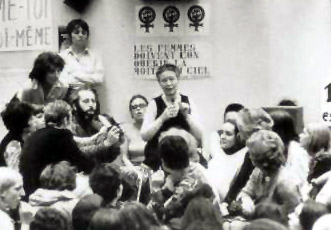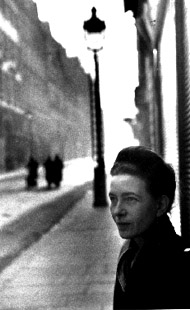How did Simone de Beauvoir's work influence either (a) the development of the modern women's rights movements or (b) existential philosophy? Simone de Beauvoir, 1908-1986, was the founder of modern feminism and a long-time French radical, novelist and existentialist philosopher. Simone de Beauvoir was born the oldest child of an upper middle-class family. Her father, Georges de Beauvoir, was a lawyer by profession. Her mother came from a very devout Catholic background, which she later tried to pass on to Simone and her sister, Helen. Beauvoir was an outstanding student. She did her postgraduate work at the École Normale Superieure, the top postgraduate program in France, where she met Jean Paul Sartre. For the first time in her life, Simone encountered someone who was her intellectual equal; it was the beginning of a relationship that lasted the rest of their lives. She graduated from the Sorbonne in 1929, writing a thesis on Leibniz. During the 1930s, Beauvoir maintained her stormy relationship with Sartre while teaching in a number of different lycees. When World War II broke out in September 1939, Sartre was called for military service. He became a prisoner of war when the French army surrendered in June 1940, but he was released in 1941. Both Beauvoir and Sartre participated in the resistance, and after the Vichy Regime dismissed Beauvoir from her teaching position, she began a novel about the resistance. When the war ended, Beauvoir and Sartre became part of a group of leading French intellectuals, including Albert Camus and André Malraux, who concerned themselves with the perceived failures of modern French society. In 1945, they founded Les Temps modernes (Modern Times) as a means to explain their social and cultural views. At the same time, Sartre suggested to Beauvoir that she undertake a book on the status of women, and in 1949 she published, La deuxième sexe (The Second Sex). This was her most famous, and influential book. It became a sourcebook of modern feminism, particularly in the United States for later feminist thinkers such as Betty Friedan and Gloria Steinem. In the book, Beauvoir explained historical reasons for the origins of women's second-rate status, and she also examined the contemporary Western woman's roles as girl, wife, mother, lesbian and prostitute. She tried to free women from an overly deterministic understanding of their roles in society: "One is not born, but rather becomes, a woman." De Beauvoir was not a feminist before writing The Second Sex; only much later in life did she claim to be one. Deriving from her own existential worldview, women were largely responsible for much of their own situation. She later, gradually softened her original extreme existential stance on freedom to a view that the individual is the product of both personal background and social context. When the Russians suppressed the Hungarian Revolution in 1956, Beauvoir and Sartre denounced the repression and broke off relations with the communist party. At the same time, they supported the Algerian revolution and called for France to give independence to Algeria. In 1968, with French students rioting in the streets, Beauvoir and Sartre were highly visible in their support of the students. When the government regained control of the situation, she stepped up her critique of French society and also began to become more active in feminist causes. After a long illness, Sartre died in 1980. Her final words on his death were: "My death will not bring us together again. This is how things are. It is in itself splendid that we were able to live our lives in harmony for so long." 
Check the Realm of Existentialism for an introduction to the philosophy (or Existential Primer: A Guide to Nothing in Particular. You can also check the Stanford Encyclopedia of Philosophy There is much available about Jean Paul Sartre, including some nice, short biographies at www.blupete.com/Literature/Biographies/Philosophy/Sartre.htm and www.dividingline.com/private/Philosophy/Philosophers/Sartre/sartre.shtml Also of use is the National Women's History Project. Finally
Schwarzer, Alice. After The Second Sex: Conversations with Simone de Beauvoir. Translated by Marianne Howarth. New York, 1984. Schwarzer, Alice. Simone de Beauvoir Today: Conversations, 1972-1982. Translated by Marianne Howarth. London, 1984. Evans, Mary. Simone de Beauvoir, A Feminist Mandarin. London, 1985. Moi, Toril. Feminist Theory and Simone de Beauvoir. Oxford, 1990. Brosman, C. Savage. Simone de Beauvoir Revisited. Boston, 1991. Mahon, Joseph. Existentialism, Feminism and Simone de Beauvoir. New York, 1997. Keefe, Terry. Simone de Beauvoir. New York, 1998. Pilardi, Jo-Ann. Simone de Beauvoir Writing the Self: Philosophy Becomes Autobiography. New York, 1998. |
